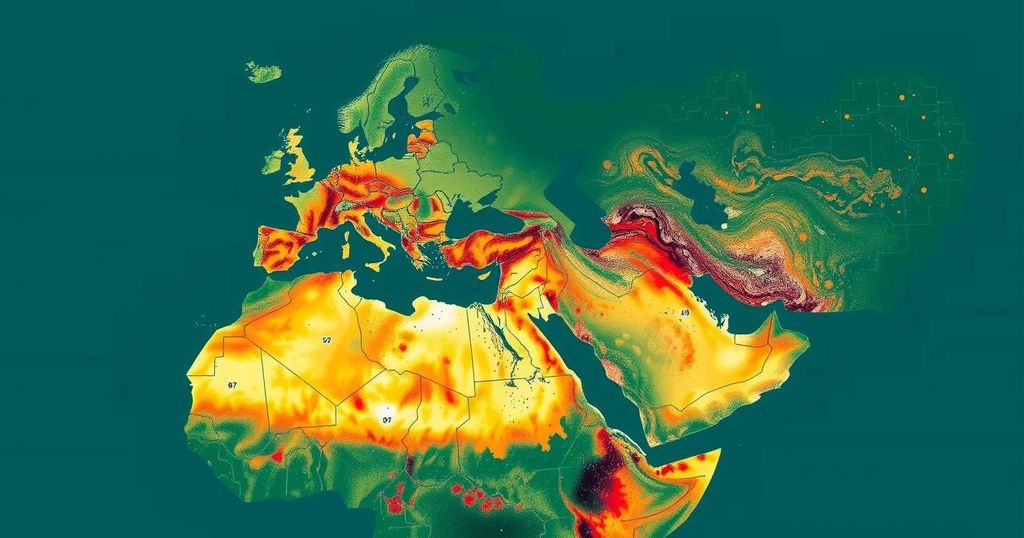Yemen: Addressing Climate Change Amidst Conflict for Sustainable Development

Yemen is experiencing an intersection of climate change and conflict, increasing risks of food insecurity and economic decline. The World Bank’s CCDR highlights urgent needs for climate-responsive investments, such as improved water management and sustainable agriculture. Without immediate action, Yemen’s GDP could drop significantly by 2040. Strategic climate resilience measures are essential for future growth and recovery, emphasizing the need for peacebuilding and international collaboration.
Yemen is confronting a complex crisis that intertwines conflict, climate change, and poverty, significantly impacting its development trajectory. The recent Yemen Country Climate and Development Report (CCDR) published by the World Bank Group emphasizes the urgent need for investments that are responsive to climate challenges, specifically in areas such as water, agriculture, and disaster risk management. With rising temperatures, erratic rainfall, and increased weather extremes, the risks of food insecurity and economic instability loom large, particularly for vulnerable populations. It is estimated that without timely interventions, Yemen’s GDP could decline by an alarming average of 3.9% by 2040 due to climate-related impacts on agriculture and infrastructure. The CCDR outlines strategic opportunities for enhancing resilience and fostering sustainable growth through targeted investments. For instance, improvements in water management and adaptive agricultural practices could result in productivity gains up to 13.5% in crop yields by 2050 under favorable climate scenarios. Nonetheless, the fisheries sector faces significant threats from rising sea temperatures, potentially experiencing losses of up to 23% by mid-century. Stephane Guimbert, World Bank Country Director for Egypt, Yemen, and Djibouti, remarked on the critical need for immediate climate resilience measures, stating, “Yemen is facing an unprecedented convergence of crises — conflict, climate change, and poverty. Immediate and decisive action on climate resilience is a matter of survival for millions of Yemenis.” In his view, investing in water security, climate-smart agriculture, and renewable energy is crucial for safeguarding human capital and laying the groundwork for sustainable recovery. The report also highlights the necessity of aligned peacebuilding efforts to address Yemen’s multifaceted crises effectively. Humanitarian assistance can alleviate some immediate challenges, yet sustainable peace is indispensable for unlocking necessary financing. The increasing frequency of disasters, such as flash floods, further stresses the importance of integrated disaster risk management strategies that particularly consider urban vulnerabilities and already strained infrastructure. Climate-induced health concerns could burden the health sector with excess costs exceeding $5 billion by 2050, thereby necessitating integration of climate resilience into health planning. Utilizing Yemen’s renewable energy potential is indicated as a vital strategy in the national climate response framework. This approach not only aims to diminish dependence on fossil fuels but also creates a robust energy infrastructure crucial for delivering vital services amidst conflict scenarios. Khawaja Aftab Ahmed, IFC’s Regional Director for the Middle East, asserted the pivotal role of the private sector in addressing developmental hurdles. He emphasized the need for innovative financing mechanisms and a favorable investment climate to mobilize the necessary funding for a greener and resilient future. The CCDR advocates for flexible, risk-informed decision-making, allowing adaptations in response to Yemen’s evolving political landscape. Under favorable conditions aligned with peace, enhanced adaptation yields significant social and economic advantages. Further, the World Bank Group’s CCDRs serve as crucial diagnostic tools that integrate climate change alongside developmental priorities. They outline actionable pathways to mitigate greenhouse gas emissions and enhance resilience and adaptation efforts, ultimately guiding countries towards fulfilling broader development objectives.
Yemen’s ongoing conflict has significantly exacerbated vulnerabilities within the country, rendering it susceptible to climate change risks. The societal strife has led to severe deficits in water and food security, creating a precarious position for the population reliant on agriculture and natural resources. The 2023 World Bank Group report seeks to address the intersection of these crises, proposing essential interventions designed to enhance climate resilience while recognizing the unique challenges posed by the Yemeni context. The interplay of rising temperatures, unpredictable precipitation, and increased frequency of extreme weather highlights the urgent need for sustainable development strategies in the face of deepening poverty and socio-economic instability.
The Yemen Country Climate and Development Report underscores the importance of immediate action to build climate resilience amidst ongoing conflict and crises. Key recommendations include targeted investments in water security, agricultural practices, and renewable energy to mitigate adverse effects on food security and economic stability. The commitment to peace and international cooperation emerges as essential for unlocking financing to enhance resilience and adapt to the challenges posed by climate change, safeguarding the future of Yemen’s population.
Original Source: reliefweb.int






